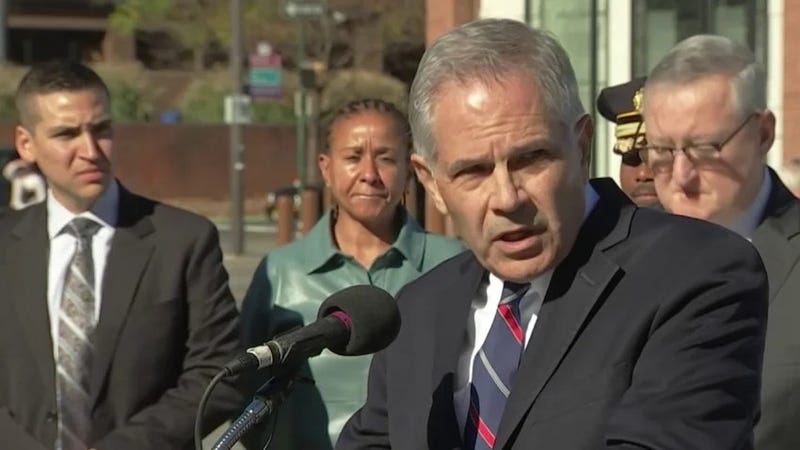
PHILADELPHIA (KYW Newsradio) — After hearing arguments for and against the attempt by Republicans in the state Legislature to remove Democratic District Attorney Larry Krasner from office, a panel of four Commonwealth Court judges sound wary about potentially violating the separation of powers.
The judges, split evenly between Democrats and Republicans, weighed precedent and authority in nearly two hours of arguments.
Attorneys for Krasner want the court to intervene, saying the district attorney has done nothing wrong and the Republican-controlled General Assembly lacks constitutional authority to impeach a local official.
Lawyer John Summers says the impeachment process is a profound distraction from allowing the elected district attorney of Philadelphia to do his job.
“They are asking for a rule that says, anytime a majority party doesn’t like the policies of a minority party, we will go impeach the guy. And we can go and get a trial. And only long later, maybe even after each person is removed, is there ever a challenge. That is a constitutional crisis. That is an invitation to chaos “
Attorney Matt Haverstick represents the Republican state legislators involved in the proceedings, who allege “misbehavior in office” in seven articles of impeachment against Krasner.
“If the DA of Philadelphia is looking for a distraction, he just created one for himself, because now he has just granted — or he wants to grant — every criminal defendant in Philadelphia the right to some independent separate process that is already spelled out in the judicial code or the crimes code, or the rules of criminal procedure. I’m not sure that’s what he really wants and that is something that this court should not do.”
Krasner, who was overwhelmingly reelected by Philadelphia voters last year, has not been charged with a crime or been sanctioned by a court. He has dismissed the House’s Nov. 16 vote to impeach him as taking aim at his ideas, a notion Democratic Judge Ellen Ceisler echoed during Thursday’s entirely virtual proceedings.
“It seems to me that these impeachment proceedings are based on disagreement with public policy and an elected official’s discretion,” Ceisler said. “I think that this proceeding could set terrible precedent in the future.”
The House asserts that Krasner should be removed from office for various reasons, including his failure to prosecute some minor crimes and his bail request policies and criticism of his management of the district attorney's office.
The impeachment is part of a wave of efforts across the country to remove progressive prosecutors over crime-fighting policies amid a rise in violent crime nationally.
Judge Patricia McCullough, a Republican, suggested that precedent prevents the court from stepping into the goings-on of the Legislature.
“The problem is you’re asking the court to intervene and that is going to set another huge precedent for the people of this commonwealth if the court can usurp its separation of powers principle and stick its hand into a process that the Supreme Court says belongs to the General Assembly,” McCullough said. “And that’s really the issue.”
Judge Michael Wojcik, a Democrat, noted that some of the impeachment articles involve the professional conduct of lawyers — a matter regulated by courts — and he questioned whether those articles overstep legislative authority.
“Is that not solely within the authority of the Supreme Court to decide and is not the House in charging this, and the Senate trying that, ostensibly violating that separation of power by delving into something that’s reserved for the courts?” Wojcik asked. “Is it not our role to protect the court’s position and authority in that regard?”
The judges didn’t say when they would rule on whether or not to get involved. The trial in the state Senate is set to begin Jan. 18.


